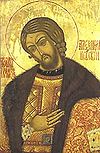- Nikolai Golovanov
-
For other people named Golovanov, see Golovanov.
Nikolai Semyonovich Golovanov (Russian: Николай Семёнович Голованов, Nikoláy Semyónovich Golovánov), [o.s. 9] 21 January 1891 – 28 August 1953, was a Soviet conductor and composer.
He conducted the premiere performances of a number of works, among them Nikolai Myaskovsky's sixth symphony in May 1924, and recorded operas and concert works by Glazunov, Mussorgsky and Liszt among others.
Golovanov held some of the highest musical positions in the USSR, including an extensive association with the Bolshoi Opera. In her autobiography, Galina Vishnevskaya terms him the theater's chief conductor, and tells of his dismissal from the Bolshoi and his death - which she attributed to the humiliation of the experience of losing this position.
It has been reported that Golovanov's firing was the result of Stalin's displeasure at Golovanov's having tried to use a Jewish singer, Mark Reizen, in the title role of Tsar Boris Godunov in his recording of Mussorgsky's opera. Golovanov actually did record the opera with Reizen as Boris, but later remade Reizen's part with another Boris, Alexander Pirogov.
Golovanov's recorded output was substantial and quite individual in interpretive approach. In his discography we find all but one of the Liszt tone poems, the complete Scriabin symphonies and Piano Concerto, Tchaikovsky's 1st and 6th symphonies, as well as shorter works, Beethoven's 1st Symphony, Violin Concerto and Triple Concerto, Rimsky-Korsakov's Scheherazade and his operas Sadko and Christmas Eve, Mussorgsky's Boris Godunov and Pictures at an Exhibition, Rachmaninoff's 2nd and 3rd symphonies, plus the opera Aleko and other compositions, Glazunov's 5th, 6th and 7th symphonies, and scores by Grieg, Mozart and others. Based upon the evidence of his recordings, Golovanov's characteristic performance mode was full-blooded and nearly vehement in tone, with a powerful, almost overloaded sense of sonority, and extreme flexibility in matters of tempo, phrasing and dynamics.
Golovanov was also a composer; his works include the opera "Princess Yurata", symphonies, two symphonic poems, orchestral suites, overtures on Russian themes, over 200 Romances, arrangements of folk songs, and a number of choral religious works.
He was a well-regarded piano accompanist in the early years of his career.
He was married to the soprano Antonina Nezhdanova.
References
Preceded by
Alexander OrlovMusic Directors, Tchaikovsky Symphony Orchestra of Moscow Radio
1937–1953Succeeded by
Aleksandr GaukPreceded by
Ari PazovskyMusic Directors, Bolshoi Theatre, Moscow
1948–1953Succeeded by
Alexander Melik-PashayevPeople from Russia Leaders and religious - Pre-1168
- 1168–1917
- 1922–1991
- 1991–present
- RSFSR leaders
- General secretaries
- Soviet premiers (1st deputies)
- Soviet heads of state (and their spouses)
- Prime ministers (1st deputies)
- Foreign ministers
- Prosecutors general
- Metropolitans and patriarchs
- Saints

Military and explorers - Field marshals
- Soviet marshals
- Admirals
- Aviators
- Cosmonauts
Scientists and inventors - Aerospace engineers
- Astronomers and astrophysicists
- Biologists
- Chemists
- Earth scientists
- Electrical engineers
- IT developers
- Linguists and philologists
- Mathematicians
- Naval engineers
- Physicians and psychologists
- Physicists
- Weaponry makers
Artists and writers Sportspeople - Chess players
Categories:- 1891 births
- 1953 deaths
- 20th-century classical composers
- Russian conductors (music)
- Russian composers
- Soviet composers
- Russian musicians
- Russian people stubs
- European conductor (music) stubs
Wikimedia Foundation. 2010.
